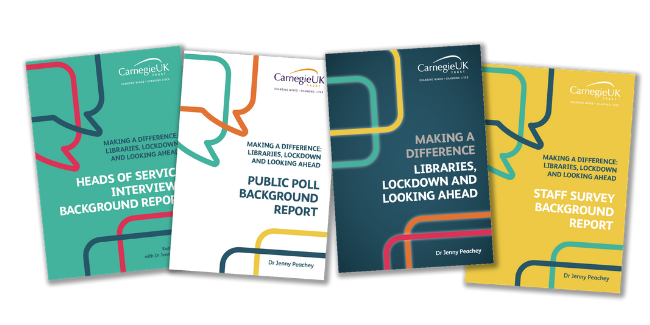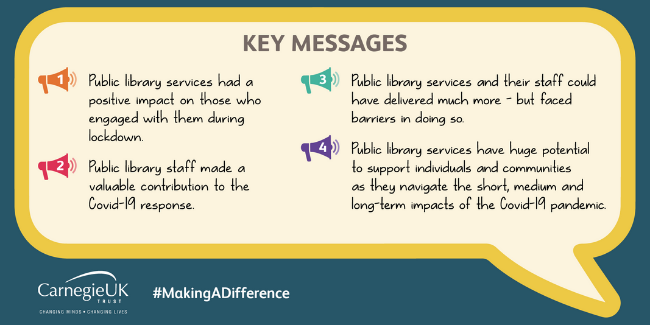
Public library staff are an integral part of library services and arguably its most vital asset. Our new research Making a Difference: Libraries, Lockdown and Looking Ahead has made this, among other things, abundantly clear.
There can be no doubt that public library services had a positive and supportive role to play during the Covid-19 lockdown. Our representative public poll of 2,196 adults across the UK reveals that of the 3 in 10 UK adults (an estimated 15 million adults) who turned to library services in lockdown, 68% said it provided them with useful information, 64% said it had a positive impact on
their wellbeing, 63% said it helped them (or their children) avoid boredom and 60% said it helped them feel less alone.

Services made an increased number of e-resources available, developed new digital activities and events for people of all a
ges, conducted welfare calls, delivered books and tech, and repurposed library buildings where possible. Only, services don’t develop and deliver themselves; and the research shows how staff innovated and flexed to meet emerging needs
in their communities in challenging times. Meanwhile, staff that were redeployed to other local authority services worked hard to support their communities through Covid-19 or Shielding phone lines, food or other parcel distribution,
care homes support and so much more.
In our staff survey, we drew on CILIP’s Professional Skills and Knowledge Base framework
to gauge which skills, if any, came to the fore during lockdown. Unsurprisingly, we found that staff within services drew heavily on their adaptability and innovation skill set. We also found a massive increase in those who developed
digital skills during lockdown.
In terms of those that were redeployed, we found that some of the specialist outreach services implemented by local authorities in lockdown required or mirrored the core skill set that library staff deployed day-to-day pre-Covid-19.
For example, around 90% of redeployed staff drew on empathy and general customer service skills, whilst 81% drew on their organising and managing knowledge and information skills.
Research findings also revealed how those that remained in services had less opportunity to draw on pre-existing skill sets relating to customer service, identifying vulnerable people and supporting literacy. This begs the question
of whether there is a limit to what can be achieved digitally – at least, in terms of how digital offers were conceived of and delivered during lockdown. It also perhaps points to how the library building is an outreach service
in itself: a space where staff can proactively identify and approach those who might otherwise be reticent to approach a support service.
Our report outlines key areas where public library services have huge potential to support individuals and communities as they navigate the ongoing impact of Covid-19
and lockdown – and eight action areas to ensure services are enabled to fulfil that potential. Given the centrality of staff to the service, it is perhaps unsurprising that one of these action areas is valuing and investing in
staff, and another is building positive organisational culture than supports leadership at all levels. It is a matter of increasing urgency and importance that these – and other areas for action – are addressed in order to enable
public library services to fulfil their potential and deliver for the individuals and communities they serve.




